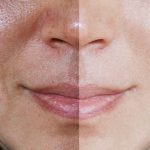Acne does not just affect young teens going through puberty but instead also affects adults of any age. About 40% to 50% of the adult population ranging from 20 to 40 years old have some sort of acne on their body.
While any gender can have hormonal acne in their adult life, it typically affects women more than men. Studies have shown that about 50% of the women population ages 20-29 deal with acne, and 25% of women ages 40-49 also deal with it. Why do women experience more hormonal acne than men?
Women tend to experience more hormone fluctuations compared to men due to puberty, menstruation cycles, pregnancy and menopause. If you suffer from hormonal acne, check out this guide on what it is and why it happens.
What causes hormonal acne?
Hormonal acne is acne that occurs when a person’s hormone level fluctuates. Fluctuations of estrogen, progesterone and testosterone can cause zits and pimples to pop up. Typically, these fluctuations happen mostly during menstruation cycles, pregnancy and menopause.
During these times of increased hormones, the body produces more sebum, an oily, waxy substance. This then leads to inflammation, changes in skin cell activity and colonization of bacteria in hair follicles. With this combination, acne starts to appear. Medications, antibiotics, specific foods, depression, anxiety, stress and other mentally triggering elements can cause hormonal acne as well.
What does hormonal acne look like?
Whiteheads, blackheads, papules, pustules, cysts and nodules are all common hormonal acne symptoms. Normally, whiteheads and blackheads do not cause pain, inflammation or swelling, but if they do, then they are most likely forming into cysts and pustules. If you do not know what a cyst is, it forms underneath the skin. It is typically tender or sore to the touch. Inflamed acne can cause redness, swelling, soreness and pain.
While hormonal acne can appear anywhere on your body, typical places depend on your age and health. Teenagers tend to have these lesions on the T-zone (forehead, nose and chin). Adults who are 20 years or older have breakouts, usually at the lower parts of their face like the jawline, chin and bottom of the cheeks. However, hormonal acne can appear on the neck, back, shoulders and chest as well.
What is the treatment of hormonal acne?
There are many treatments to clear up hormonal acne. From over-the-counter options to face washes and creams to DIY methods and doctor-prescribed medications, you can try out many different techniques to get rid of your acne. Look for products and cleaners that include salicylic or glycolic acid. These ingredients stop bacteria and reduce inflammation.
If you go with the cream option, dermatologists recommend patients use topical retinoids. Retinoids can help rid your skin of dead skin cells that end up clogging your pores. And over time, these creams will help your skin stay clear. While you can find many of them over the counter, your doctor can prescribe a higher dose for more severe acne.
Some patients cure their acne problems with DIY or natural methods. Tea tree oil and alpha hydroxy acid are some of the best ways to fight hormonal acne organically. For more severe acne, contact your doctor or dermatologist.
If you are a woman, one of the medications a health specialist might recommend is birth control. Birth control balances out your hormones and clears your skin. However, not every woman can take oral contraceptives, and men cannot at all. So what can a doctor recommend? The next medication they can give you is anti-androgen drugs. Anti-androgen drugs suppress the male hormone androgen, which lowers oil production and secretion.
When should you see a dermatologist?
Visit a doctor when the acne is severe, reoccurring, itchy or painful. It is also wise to see a dermatologist before you try any DIY products or over-the-counter items. A doctor can evaluate your acne and tell you what treatments are best for you and your skin. If you notice any allergic reactions or worsening acne cases, contact your doctor immediately.
Hormonal acne does not have to take over your life. Keep your face clear and stay confident by visiting your dermatologist. For more information, contact us today.






